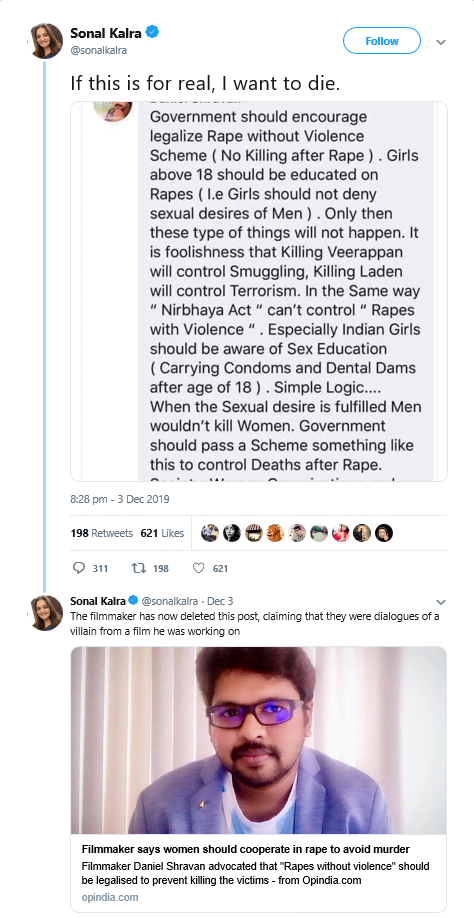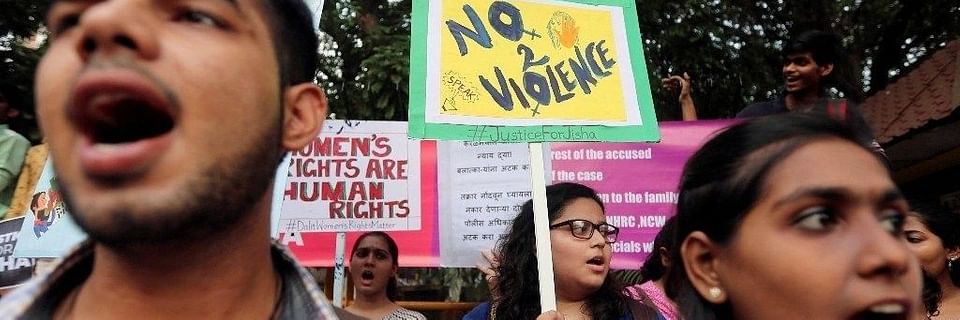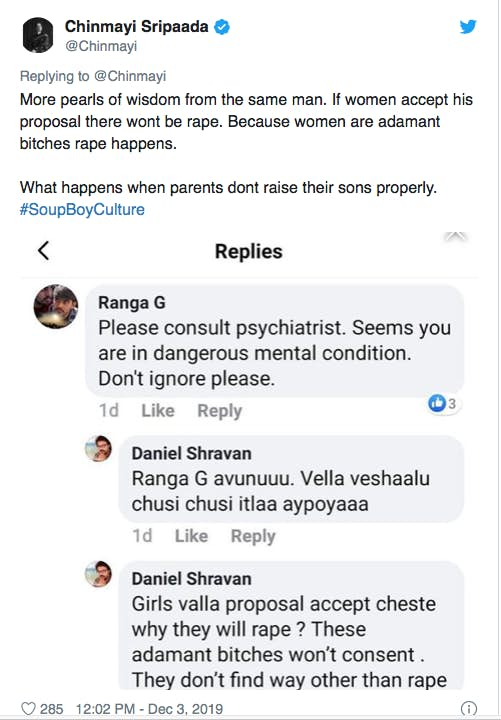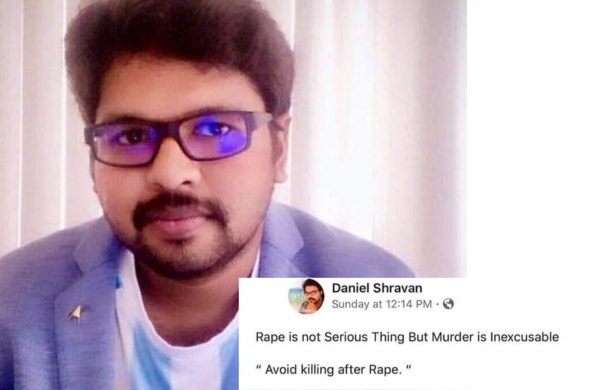Trigger Warning: Rape/Sexual Violence
The title of this article is intentionally posed as a question; one that made me uncomfortable at first, but later became a point of curiosity. While the dominant narrative about certain rape cases which make it to our social media channels, and then to our everyday conscience (although for a short period of time) is of a sensationalist-mindless outrage (death penalty, revenge, lynching, burning alive), however, a few atypical comments also make their way to fame. And if you are, by any chance, an influential person in society, your comment turns a topic of both scrutiny and relatability. Daniel Shravan, a Telugu Filmmaker, recently expressed his opinions about the Hyderabad rape-murder case. In his statement, he asserted, “Rape is not a serious thing, but murder is inexcusable. Avoid killing after rape.”

Mind you, he did not stop there. He further added an advice saying, “Women should carry condoms and cooperate in rape”. Daniel Shravan, women’s “knight in shining armour”, also felt that “rape without violence”, and by “violence” he means murder not rape, should be legalised in order for women to save their lives. This is certainly not the first time that such comments have come to light. In 2014, Trinamool Congress candidate and Tollywood actor, Dipak Adhikari, popularly known as Dev made similar remarks by comparing rape to elections. He said, “Enjoy…it(elections) is just like being raped. You can either shout or you can enjoy.”
Where Do They Get Such Ideas?
I would not call such preachy comments “bizarre”, since as a survivor of sexual harassment myself, such thoughts have crossed my mind too; hence, the faint relatability to Shravan’s comments. What would I do if an individual or a group of individuals try to rape me? Would I scream for help? Or would I try to bargain my consent in exchange for my life?
I would also avoid referring to his views as “pervert”, because that would connote that such comments stem from some psychological issue, which it certainly does not. These comments are rooted in our socio-political contexts of everyday life, where we are exposed to multiple intersections of media representations, family politics, power relationships, gendered structures and patriarchal constructs of our society.

Daniel Shravan and I share the same social. We both watch films or read books which portray women as “secretly desiring rape or sexual assault”. We come across married women who have internalised and normalised marital rape, and we both have watched or at least are aware of the non-consensual, hate-pornography available on the internet. These pop-culture representations are not merely “things of entertainment”, but they infiltrate as a continuous part of our lives, where we derive inspiration from, and concurrently, inspire them. Of course, there are differences in his and my life-worlds, opinions and experiences. However, we both are aware that rape exists and women are mostly the victims of rape and sexual violence.
What Do Women Think?
Most or all women, by default of living in a rape culture, inevitably think about such situations of assault, violence and rape, and contemplate their possible responses in that situation. “I might freeze”, “I would try to bribe my way out”, “I would just give in, so that my rapist does not kill me”, were a few responses I gathered from the conversations with my peers. The one common that could be found between these women and Shravan, would be the inevitable anticipation of rape and the routinisation of rape culture.
Rape is violence. Rape is as violent as murder and cannot be excused either. An oxymoron in it itself, the phrase “rape without violence” fails to perceive and comprehend women’s agency, because for people like Shravan, men and their sexual desires are the only active partakers in rape cases.
However, do such shared meanings of rape justify his comments about legitimising “rape without violence”? No. Rape is violence. Rape is as violent as murder and cannot be excused either. An oxymoron in it itself, the phrase “rape without violence” fails to perceive and comprehend women’s agency, because for people like Shravan, men and their sexual desires are the only active partakers in rape cases. Women are seen as passive bodies with life in them, but without a conscience. And therefore, death, or the forceful end of life, is the only marker of violence for them. Anything less or different does not qualify.
Few Other Comments To Dismiss Women
While such a notion is one of the most extreme understandings of violence in society, for some other people, the absence of any physical injury and their visible impression on the body is a requisite to qualify any action as “violent” in nature. Hence, rape survivors and victims are often insufferably questioned about the “authenticity” of their rape allegations. They are asked to show tangible or visible evidence, preferably on their bodies. Emotional or symbolic violence, in the form of intimidation, threatening or blackmailing which could lead to sexual violence is snubbed as “feminine exaggeration”. This is why, most rape cases that make it to the media are also the ones where the victim has either been dreadfully physically hurt or is simply dead.

The “authenticity” is also questioned in rape cases where the victim’s body shows any sign of sexual arousal, such as a self-lubricated vagina. It is often assumed that signs of vaginal discharge or self-lubrication are “biological processes” that could have only one implication: that the woman is “enjoying” being raped. While there could be multiple explanations for self-lubrication during rape, such as, it is the vagina’s way of resisting the pain caused due to penetration, we need to understand that such explanations should not be demanded in the first place. Another way to assert that “women enjoy being raped” would be the appalling judgement, “She did not act like a rape victim,” often heard when women survive or cope through rape. Their accounts are abandoned on grounds that they are not distraught enough after the incident. The list is endless and so are the ways of dismissing women’s agency, their voices and their experiences.
Also read: Hyderabad: What Women Are Told After Every Rape Case In India?
Delegitimising Women’s Voices To Legitimise Sexual Violence
IF MEN LIKE DANIEL SHRAVAN, WOULD EXPERIENCE AND ENCOUNTER THE RAPE CULTURE, IN THE SAME WAY THAT WOMEN DO, SUCH STATEMENTS WOULD NOT COME TO LIGHT, WITHOUT ANY HESITATION OR REPEATED DELIBERATIONS.
Such comments like, “Women should carry condoms and cooperate in rape” also originate from the larger assumption that only women are or can be raped, which corresponds to the notion that men are sheltered from becoming victims of our rape culture. While men too have been victims of rape in the past, however, the presumption that women are the primary targets of rape perpetrators validate the differences in experiences of men and women. When it is told, “We live in a culture of rape”, it is implicated that women, all across the world, are terrorised by the possibility of being sexually harassed in their everyday lives, both in public and private spaces. If men like Daniel Shravan, would experience and encounter the rape culture, in the same way that women do, such statements would not come to light, without any hesitation or repeated deliberations.

Women too contemplate escaping situations of violence or rape. However, as the primary victims of rape culture, they might decide on a variety of responses, including surrendering themselves to their perpetrators. This obviously does not necessarily mean that they will definitely be able to make it out alive. This gendered difference of navigating through life needs to be taken into consideration before making lousy comments and encouraging legitimacy to the culture of rape. When imprudent men like Daniel Shravan, ask women to “carry condoms” or “enjoy” their way out of a violent situation, they should be reprimanded and censured.
Also read: How Could The Media Have Done Better In Covering The Hyderabad Rape-Murder? | #GBVinMedia
The process of legitimising rape culture demands delegitimisation of women’s narratives. This does not need to occur by a direct disregard of women’s voices, but could be through forms of micro-violence like repeated questioning about the incident, doubting their experiences, manipulating them to believe that rape or sexual harassment is their fate and they should simply adjust to such conditions and by maneuvering their narratives to create a false sense of how women perceive rape and the effect that it has on their lives. Such mindlessness perpetuates rape culture and socialises men into thinking that their sexual desires are over a woman’s consent and her life.
Featured Image Source: New Indian Express
About the author(s)
Pragya is a Master's Graduate in Sociology from Jawaharlal Nehru University. She works as the content editor at Feminism In India. She is also a ramen enthusiast, a hummus mother, a postcard hoarder and a wannabe cat lady. She still prefers writing on her notebooks, rather than on her laptop, but her job demands her to do just the opposite. Her favourite season is spring, and her alter ego is that of Mrs. Dalloway who said, "She would buy the flowers herself", in case no man ever buys her any!




